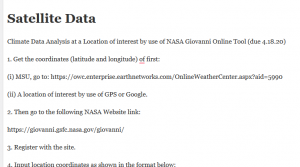Satellite Data

Climate Data Analysis at a Location of interest by use of NASA Giovanni Online Tool (due 4.18.20)
1. Get the coordinates (latitude and longitude) of first:
(i) MSU, go to: https://owc.enterprise.earthnetworks.com/OnlineWeatherCenter.aspx?aid=5990
(ii) A location of interest by use of GPS or Google.
2. Then go to the following NASA Website link:
https://giovanni.gsfc.nasa.gov/giovanni/
3. Register with the site.
4. Input location coordinates as shown in the format below:
Select Region (Bounding Box or Shapefile)
Format: West, South, East, North
5. Go to Select Measurements then select Disciplines of choice: Energy, Flooding and Wind Energy
6. Under Variable, select your Variable for analysis (as shown below, e.g. Wind Stress Magnitude (GSSTFMv3). For
analysis, select ONLY ONE variable at a time.
7. Under Time Series, select Area-Averaged or Seasonal then,
8. If you Select Seasonal then input selections: DJF, MAM, JJA, SON
9. Based on your variable, input Begin and End dates, complete years, i.e., beginning January and ending December of
each valid data range.
2
Table 1: Variable for Individual Analysis
ID # Variable Source Temp.Res. Spat.Res. Begin Date End Date Units
243366 Wind Stress Magnitude (GSSTFM v3) SSMI Monthly 0.25 ° 7/1/1987 12/31/2008 N/m^2
259854 Near surface wind speed (GLDAS_NOAH10_M
v2.0)
GLDAS
Model Monthly 1 ° 1/1/1948 12/31/2010 m s-1
229726 Convective Available Potential Energy at 180-0 mb
above ground (NLDAS_FORA0125_H v002)
NLDAS
Model Hourly 0.125 ° 1/1/1979 9/14/2017 J/kg
85460 Wind speed (NARR hybrid level zonal
wind) (NLDAS_FORB0125_H v002)
NLDAS
Model Hourly 0.125 ° 1/1/1979 9/14/2017 m/s
261161 Wind Speed (10-m above ground Meridional
wind) (NLDAS_FORA0125_H v002)
NLDAS
Model Hourly 0.125 ° 1/1/1979 9/14/2017 m/s
236172 Near surface wind speed (GLDAS_NOAH025_M
v2.0)
GLDAS
Model Monthly 0.25 ° 1/1/1948 12/31/2010 m s-1
258299
Wind speed (FLDAS_NOAH01_A_EA_M v001)
FLDAS
Model Monthly 0.1 ° 1/1/2001 8/31/2017 m s-1
243497
Wind speed (FLDAS_VIC025_A_WA_M v001) FLDAS
Model Monthly 0.25 ° 1/1/2001 8/31/2017 m s-1
3
Table 2: Variable for Individual Analysis 224017
Climatology (1980-2009) of Wind speed (10-m above ground Zonal wind) (NLDAS_FORA0125_MC v002)
NLDAS Model Monthly 0.125 ° 1/1/1980 12/31/2009 m/s
254274 Climatology (1980-2009) of Wind Speed (10-m
above ground Meridional wind)
(NLDAS_FORA0125_MC v002) NLDAS
Model Monthly 0.125 ° 1/1/1980 12/31/2009 m/s
255443
Wind speed (10-m above ground Zonal wind) (NLDAS_FORA0125_H v002)
NLDAS Model Hourly 0.125 ° 1/1/1979 9/14/2017 m/s
224119
Total latent energy flux (M2TMNXFLX v5.12.4) MERRA-2
Model Monthly 0.5 x 0.625 ° 1/1/1980 7/31/2017 W m-2
206628 Sensible heat flux from turbulence (M2TMNXFLX
v5.12.4) MERRA-2
Model Monthly 0.5 x 0.625 ° 1/1/1980 7/31/2017 W m-2
270312
Eastward surface stress (M2TMNXFLX v5.12.4) MERRA-2
Model Monthly 0.5 x 0.625 ° 1/1/1980 7/31/2017 N m-2
223831
Northward surface stress (M2TMNXFLX v5.12.4) MERRA-2
Model Monthly 0.5 x 0.625 ° 1/1/1980 7/31/2017 N m-2
269475 Wind speed (NARR hybrid level meridional
wind) (NLDAS_FORB0125_H v002) NLDAS
Model Hourly 0.125 ° 1/1/1979 9/14/2017 m/s
247438 Convective Available Potential Energy at 180-0 mb
above ground (NLDAS_FORA0125_M v002) NLDAS
Model Monthly 0.125 ° 1/1/1979 8/31/2017 J/kg
228613 Daily average photosynthetically available radiation (PAR) (SeaWiFS_L3m_PAR v2014) Monthly 9 km 9/4/1997 12/11/2010
einstein m^-2 day^-1
150831
4
Table 3: Variable for Individual Analysis
ID # Variable 252408
Flooded area (NCALDAS_NOAH0125_D v001) Daily 0.125 ° 1/2/1979 12/31/2015 m^2 238750
Flooded fraction (NCALDAS_NOAH0125_D v001) Daily 0.125 ° 1/2/1979 12/31/2015 fraction 91180
Irrigated water rate (NCALDAS_NOAH0125_D v001) Daily 0.125 ° 1/2/1979 12/31/2015 kg m-2 s-1 250047
Wind speed (NCALDAS_NOAH0125_D v001) Daily 0.125 ° 1/2/1979 12/31/2015 m s-1 244229
Incident shortwave land (M2TMNXLFO v5.12.4) Monthly 0.5 x 0.625 ° 1/1/1980 7/31/2017 W m-2
2001059 Ground heating land (M2TMNXLND v5.12.4) Monthly
0.5 x 0.625 ° 1/1/1980 7/31/2017 W m-2
aa Climatology (1980-2009) of Wind speed (10-m
above ground Zonal wind) (NLDAS_FORA0125_MC v002)
NLDAS Model Monthly 0.125 ° 1/1/1980 12/31/2009 m/s
bb Black Carbon Surface Mass Concentration, time
average (M2T1NXAER v5.12.4) MERRA-2
Model Hourly 0.5 x 0.625 ° 1980-01-01 2020-02-29 kg m-3
cc Water Vapor Mass Mixing Ratio at Surface
(Daytime/Ascending) (AIRX3STD v006) AIRS Daily 1 ° 2002-08-31 2016-09-24 g/kg
dd
Ground heating land (M2TMNXLND v5.12.4) MERRA-2
Model Monthly 0.5 x 0.625 ° 1980-01-01 2020-02-29 W m-2
ee SO2 Column Mass Density (ENSEMBLE), time
average (M2T1NXAER v5.12.4) MERRA-2
Model Hourly 0.5 x 0.625 ° 1980-01-01 2020-02-29 kg m-2
ff Dust Column Mass Density – PM 2.5
(M2TMNXAER v5.12.4) MERRA-2
Model Monthly 0.5×0.625° 1980-01-01 2020-02-29 kg m-2
gg Surface Runoff (Non-Infiltrating)
(NLDAS_NOAH0125_H v002) NLDAS
Model Hourly 0.125° 1979-01-02 2020-04-01 kg/m2
5
10. Check or correct input of coordinates, time series and seasonal selections in case changes due parameter
selections.
11. Then select Plot Data.
12. Observe data analysis if no error.
13. If there is an error, go back to user input for any corrections.
14. Under chart content, right hand side of plot, download your plot for your report and follow the “Tenets of
Technical Report”.
15. Under Acknowledgments, include the following: “Analyses and visualizations used in this
[study/paper/presentation] were produced with the Giovanni online data system developed and maintained by
the NASA GES DISC.”
16. Do another parameter at a location of your vested interests.
17. To learn more about any parameter, “click” on the hyperlink for more information from the NASA GES DISC
Library.
18. Because many scientists from all over the world use these resources, select a time for your analysis when
scientists from most developed economies are “asleep!”
19. Also many users require these services. Register with Giovanni that you are a user of these services.
20. Finally, keep us posted on your analytical challenges and interests so that we can assist especially in the data
interpretations and displays for enhancing your technical reports for other targeted audiences especially
scientists and policy makers.
8
Examples of Giovanni Analysis from a Location in Ghana
(a) Time Series Analysis for Relative Humidity Surface for 2011-2016
9
(b) Seasonal Analysis for Relative Humidity Surface for 2011-2016